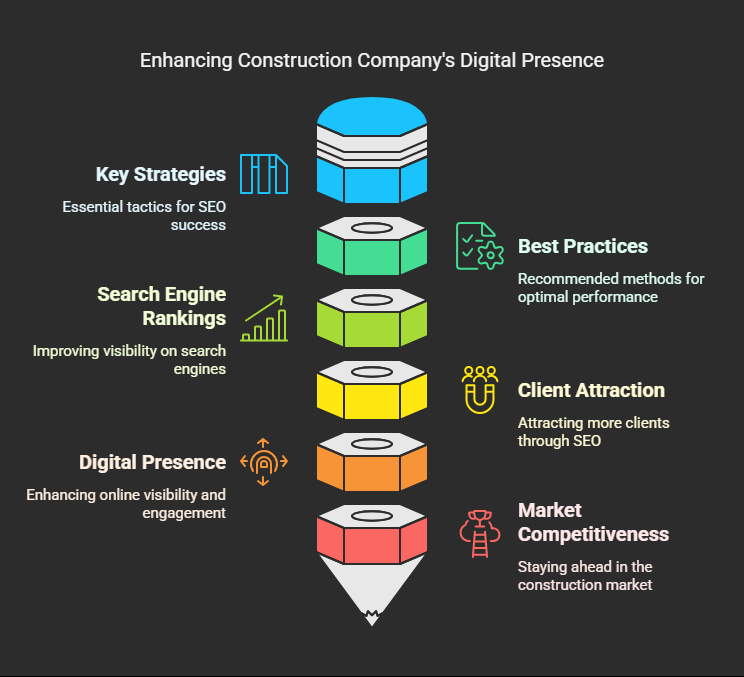I hope you enjoy reading this blog post.
If you want to get more traffic, Contact Us

Click Here - Free 30-Minute Strategy Session
Be quick! FREE spots are almost gone for this Month. Free Quote

Search Engine Optimisation (SEO) has become a critical tool for construction companies aiming to remain competitive in 2025. With more businesses shifting their focus online, it is essential to optimise websites so that potential clients can easily find them. Construction companies need SEO to improve their visibility in local search results, attract niche-specific clients, and beat competitors.
Key elements include:

Click Here – Free 30-Minute Strategy Session
Be quick! FREE spots are almost gone for this Month
SEO helps construction firms turn their websites into lead-generating assets.
Search engine optimisation allows construction businesses to strengthen their online presence and attract targeted leads. As potential clients increasingly turn to the internet for services, ranking well on search engines ensures visibility. Local SEO strategies help construction companies tap into specific geographical markets by appearing in searches like “construction services near me.” Competitors already prioritise SEO, making its adoption essential for staying relevant. Ignoring SEO risks losing opportunities to competitors who dominate digital searches. It also drives website traffic, builds authority, and establishes credibility through higher search rankings, making it indispensable for long-term growth and success in the construction industry.
Effective keyword research is essential for construction companies aiming to improve online visibility. Businesses should identify terms and phrases their target audience commonly searches for, focusing on service-specific and location-based keywords, such as “residential construction in London” or “commercial builders in Birmingham.”
To identify relevant keywords, utilise tools like Google Keyword Planner, SEMrush, or Ahrefs. Pay attention to search intent by categorising terms into informational, navigational, or transactional purposes. Prioritise long-tail keywords, as they often attract high-conversion traffic.
Additionally, analyse competitors to uncover gaps and opportunities. Regularly update and refine keyword lists to stay aligned with emerging trends, seasonal changes, and industry-specific terminology.
To improve local SEO for a construction company’s website, several steps must be taken to ensure maximum visibility in the area being targeted. Begin by creating and optimising a Google Business Profile. Include accurate contact information, hours, and service details to establish credibility and improve local search rankings.
Integrate location-specific keywords strategically into your web pages, meta titles, and descriptions. Use headers and content that naturally emphasise the areas served. Adding schema markup enhances search engines’ understanding of your business.
Secure local backlinks through partnerships with nearby contractors, suppliers, or local directories. Encouraging customer reviews also boosts rankings and builds trust in local markets.
Effective content strategies are crucial for construction companies aiming to boost SEO performance. Focusing on high-quality, relevant content tailored to your audience’s needs helps attract traffic and generate leads.
Consistent content updates and optimisation ensure long-term visibility and sustained traffic growth.
Technical SEO ensures that a construction company’s website is optimised for search engines and functions seamlessly for users. It focuses on the backend elements, which directly impact how search engines crawl, index, and rank the website. Key areas include:
Technical SEO provides the foundation for broader optimisation strategies, bridging performance gaps and enhancing visibility for niche audiences.
Online reviews and reputation management play a critical role in SEO success for construction companies. Potential customers often rely on reviews to assess credibility and quality. Businesses can enhance trust by consistently monitoring and responding to reviews across platforms, such as Google and Yelp.
Key strategies include:
Building trust through proactive reputation management boosts conversion rates and search rankings.
Google My Business (GMB) is a crucial tool for construction companies aiming to optimise their local search presence. It enables businesses to manage their online profiles and appear in relevant local searches. To maximise its potential, a company should ensure the following:
Optimised GMB profiles improve local visibility and attract high-quality leads organically.
A responsive website is vital for construction companies aiming to rank higher in search results in 2025. Over 60% of web traffic now comes from mobile devices, making mobile-friendliness non-negotiable. Ensure the website layout adapts seamlessly to different screen sizes, providing a consistent user experience.
Key practices include:
Regularly test the site for responsiveness using tools like Google’s Mobile-Friendly Test to identify and fix any design flaws promptly.
Construction companies can leverage link-building to improve their website’s authority and visibility. Below are tailored tactics for this niche:
Effective execution of these tactics ensures sustainable backlink growth, enhancing search rankings.
Monitoring SEO performance requires leveraging robust tools and understanding critical metrics specific to a construction company’s digital presence. Tools like Google Analytics enable tracking website traffic, user behaviour, and conversion rates, while Google Search Console provides insights into search performance, indexation, and crawl errors.
Key metrics include:
Regular audits ensure strategy alignment with SEO goals.
The construction sector in 2025 is seeing a shift in SEO strategies due to evolving industry practices and search engine algorithms. Businesses must adapt to these emerging trends to stay competitive in online visibility.
These trends demand precision and adaptability to capitalise on evolving search preferences.
Achieving SEO success in 2025 for construction companies requires a well-rounded and strategic approach tailored to the industry’s ever-evolving digital landscape. By focusing on local SEO, optimising website structure, and delivering high-quality, keyword-rich content, businesses can significantly enhance their online presence.
Ensure mobile optimisation remains a priority due to the increasing reliance on smartphones in customer searches. Additionally, embracing emerging trends such as voice search and AI tools can help maintain a competitive edge. Regular performance monitoring and keeping abreast of algorithm updates enable construction companies to adapt strategies and sustain long-term results.

LEAVE A REPLY